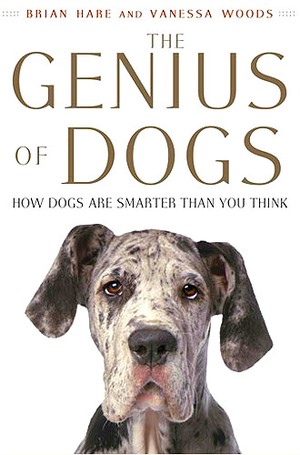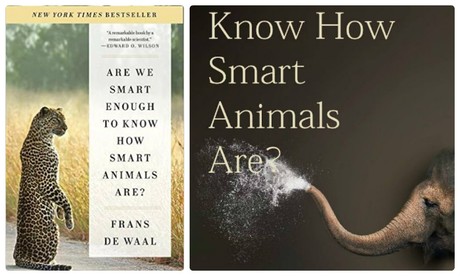How smart is this dog? How dumb is this question?

Food puzzles aim to stimulate the mind (and slow the mouth). Trixie Dog Activity Poker Box 1, https://www.trixie.de/heimtierbedarf/us/shop/Dog/ActivityGames/.
When walking the dogs, I'm often approached by people imagining life with a dog of their own. After selecting the cutest dog (to them), their first question is always "How smart is this dog?" Apparently our dogs should be both brainy and beautiful. Basking in reflected glory is part of the deal.
No one ever asks whether the dog is calm, affectionate, or in favour of world peace. Or whether the dog is funny, which, according to my on-line search, is really the crux of the matter: search for 'funny things dogs do' and you'll get ten times the results (39 million) than when searching 'smart things dogs do.'
To the 'how smart is this dog?' question, I always reply in a sincere tone, "S/he's brilliant!" Every dog is, in their own way. Check out the book, 'The Genius of Dogs,' if you don't believe me. They're all little Einsteins.

The Genius of Dogs, by Brian Hare and Vanessa Woods, Penguin Group Inc., 2013.
Sometimes I turn the question back on my querier and ask, "What's a 'smart' dog?"
"A dog who understands what I want, does it... and maybe knows fetch," is the typical answer. A pretty limited definition. It makes me wonder if we are we smart enough to know how smart animals are — a question asked in a recent book by ethologist Frans de Waal. De Waal shows in detail how humans have underestimated and misjudged animals' abilities. But he's an optimist. He thinks that, despite our prejudices and anthropocentrism, we humans are smart enough to appreciate other species' intelligence.
I doubt it.
And I include myself, fellow dog people, and 'dognition' experts in my skepticism. We're way too biased.
Let's look at one of the most common (mis)conceptions. In Decoding Your Dog, a book by US veterinary behaviourists, one contributor outlines the 'wolves are smarter than dogs because they are better at independent problem solving' theory. Really? Around here, when crate doors are slightly ajar, Notley just noses hers open and goes in (the 'wolf' solution), whereas McCracken stands in front of his and gives his "Help!" bark (the 'dog' solution). I come and open the door wide enough for Himself to go in. Who has achieved what she wants fastest? But who has managed to turn his human into a flunkey? Who is smarter?

With drawings by the author. W.W. Norton & Company., Inc., 2016.
(And lest you attribute McCracken's behaviour to his timidity in the face of physical barriers, as I first did, keep in mind that he negotiates everything. When sniffing outside, McCracken will stop, wait for me to look at him, then humbly ask for cooperation or concessions. Mack Crack's the kind of guy who would ask for directions even when he's not lost. That way you can feel good about helping him out.)
The independent problem-solving schtick is just one subject in the field of 'dognition'. Animal studies are not new, but they are a rapidly expanding territory, currently including spatial navigation, problem solving, rule learning, language and numeracy skills, tool use, theory of mind, consciousness, etc. — the research papers are piling up. And a lot of them, unlike de Waal's book, don't pay much attention to human biases.
As a dog walker, I have my own prejudices about what makes a dog smart. Leash IQ, for one thing. Can they figure out how to untangle themselves? Or do they come to a paralyzed stop, go completely and unhelpfully rigid, and resist my every attempt to disentangle them? Ben, a black lab, had a Leash IQ in the single digits. When I would go into a house to pick up a dog, the waiting Ben always trussed himself up like a turkey in a game of Twister. When I came out, Bondage Ben would be moaning softly, while the other dogs looked on with puzzled interest.

Edited by Debra F. Horowitz, John Ciribassi, with Steve Dale. Houghton Mifflin Harcourt 2015.
Also, there's Environmental Intelligence. Not universal, despite dogs' back-to-nature vibe. Dogs who have it will slow their walk pace to linger in the shade on a hot day, and speed up in the sun in order to get to the next patch of shade. This took me a while to cotton on to, which tells you something about my EI. And in the winter, some dogs not only know it's the mix of snow and salt that burns their paws, they solve the problem by moving to walk where there's less salt. In my limited field research, there doesn't seem to be a connection between the degree of discomfort experienced (dogs really bothered by sun or salt) and the ability to figure out how to mitigate their effects. They get it or they don't.
And what about the other, more important, EI, i.e. Emotional Intelligence? Borrowing from human psychologists, I use this term to refer to a dog's ability to process emotional information (theirs, ours) and use it to navigate their environment. I love training sessions, not because I get can certain behaviours from my dogs (though that's nice when it happens), but because I get a much clearer picture of their EI, and a better understanding of who they are. For instance, despite his talent in the art of the deal, McCracken is not our family's Unstable Genius — that title goes to the combustible, easily bored and distracted, and yet very shrewd Notley.
Emotional intelligence includes qualities like self-regulation, awareness, flexibility, initiative, empathy, team work and (not mentioned in the human EI stuff I've looked at) trust and tomfoolery. Observing an individual dog's EI is the main way I learn how to relate to them. Who gets too excited or too frustrated to think? Who is reluctant to try something novel? Who feels easily bossed or coerced, and who considers staging a coup? Who is afraid of making mistakes? Who hasn't noticed there's such a thing as a 'mistake'? (I know, I know, never say 'no' if you want to encourage improvisational thinking.)

Notley: Why does her predictable unpredictability always take me by surprise?
Of course, the dogs likewise are learning to relate to my emotional patterns. Who shuts down when they get frustrated? Who is easily conned or amused? Who should never, ever train with her home pack in the evening?
Anyhow, I'd argue that the qualities of Emotional Intelligence are by far the most important in our relationships with dogs. Please note, I try not to use EI to measure competency; humans love to turn everything into an evaluation, a competition or a quest for improvement. I use EI to appreciate who the dogs are in relation to me, and vice versa, and I use training as a vehicle to do it. And yes, that vehicle takes us somewhere different from where we started, but I don't have a particular destination in mind.
If you're sensing a new agey 'it's all about the journey' message here, your EI is pretty good. And as it turns out, in the symbiotic set up of life with dogs, your EI is just as important, if not more, than theirs. So how calm, affectionate, and in favour of world peace are you?
Want to make a comment and avoid registering with Disqus? Click on 'join the discussion' and in the name field at the bottom of the form check "I'd rather post as a guest." A name and email address are still required.